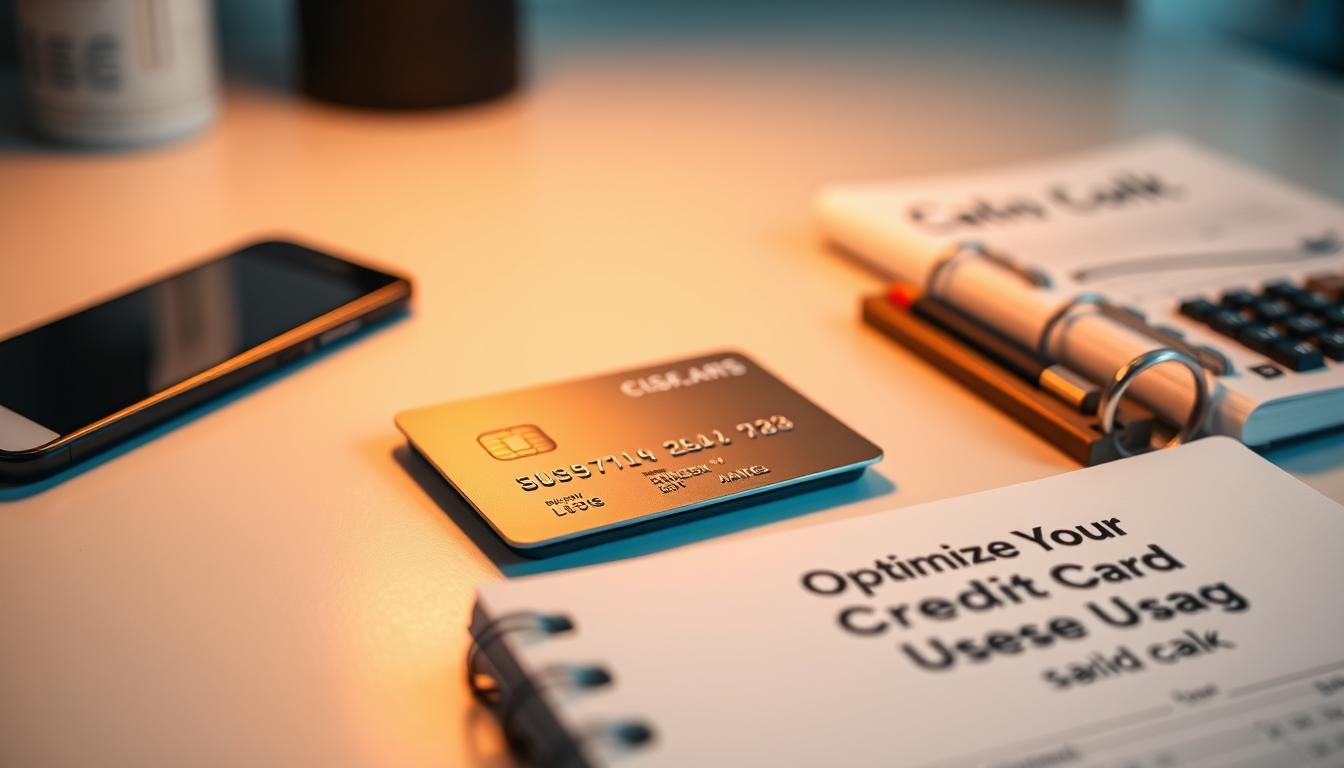
Managing your credit card wisely is key to staying financially healthy. Using your card smartly means knowing all its perks. This includes earning a good credit score and getting rewards, like cash back and insurance. By using your credit card wisely, you can build a strong credit history. This helps you when you want to get loans or good deals in the future.
Key Takeaways
- Understand and utilize your card’s benefits.
- Maintain good financial health through strategic usage.
- Boost your credit history with responsible management.
- Leverage rewards and benefits for maximum advantage.
- Prepare for favorable loan and financial agreement opportunities.
Understand Your Credit Card Terms and Conditions
It’s key to know your credit card’s rules. These include fees, interest rates, and your max spending limit. Such details help keep your account in good shape.
Getting the terms can prevent surprises and lead to smarter choices. For example, you pay interest if the full bill isn’t cleared by its due date. Your statement will show the yearly interest rate for purchases, cash needs, and shifting debts.
Some cards let you spread the cost of big buys over time. This can have a lower rate than the usual one. Also, transferring debt to these cards might offer low rates for a while before they go up again.
Best card habits might mean using tools like the CreditSmart Spend Report. This sorts your buys into ten groups to help keep an eye on spending. Setting up alerts for late payments or going over budget can keep you in check financially.
To clarify, here’s a table that compares various credit card terms:
| Term | Description |
|---|---|
| Interest Rate | The percentage charged on unpaid balances. |
| Annual Fee | A yearly charge for credit card ownership. |
| Late Payment Fee | A charge for not making a payment by the due date. |
| Cash Advance Fee | An additional fee for withdrawing cash using your credit card. |
| Credit Limit | The maximum amount you can charge to your credit card. |
| Balance Transfer Rate | The interest rate charged on transferred balances. |
Knowing these terms lets you use your card wisely. This way, you can enjoy perks without falling into traps. It leads to better money management and a healthier financial life.
Make Consistent, On-time Payments
Consistent, on-time payments are key for a good credit score. They help you avoid late fees. They also show you use credit wisely. This keeps your credit healthy.
Set Up Automatic Payments
Automatic payments make sure you pay on time. They take money from your bank automatically. This helps you avoid late payments. It’s a good way to stay on track.
Understand Minimum Payments
Paying the minimum is easy, but it costs more in the end. Try to pay more than that. Paying more lowers your interest and debt faster. This boosts your credit score.
| Payment Strategy | Benefits |
|---|---|
| Consistent On-time Payments | Avoids late fees, improves credit score |
| Automatic Payments | Reduces risk of missed payments, saves time |
| Paying More than Minimum | Reduces interest costs, shortens debt period |
These tips will not only lift your credit score but also bring you financial calm and confidence.
Credit Card Management Techniques
It’s smart to manage your credit cards wisely. One good way is to check your spending often. By writing down what you spend, you make sure you don’t go over your budget. This helps you avoid spending too much. It’s a big part of credit card budgeting.
Look at your monthly bills to see where your money goes. This can show you where you might be spending too much. Also, try not to use up all your credit. This will help lower your credit card debt and keep your credit score good.
Using your cards’ rewards and benefits is also smart. Making the most of these can save you money. It turns your cards into tools that help you, not hurt you.
Maximize Your Credit Card Rewards
To get the most from your credit card, pick one that suits your buying habits. By knowing the rewards and using special offers, you can get more travel perks or cash back.
Choose the Right Reward Card
Look at where you spend your money to find the best card. This can increase your rewards from things like groceries, gas, or eating out.
Understand Reward Categories
Different cards reward different things. Make sure you know which ones give you the most points or cash back. Some are better for travel, while others are good for dining or shopping.
Leverage Introductory Offers
Introductory offers can boost your rewards. These deals often give you extra points or cash for spending a set amount early on. Taking advantage of these can really up your rewards.
Monitor Your Credit Card Statements Regularly
It’s key to keep an eye on your credit card management. When you check credit statements often, you watch your spending better. This helps you notice any wrong charges quickly for easy fixing.
Knowing when your bill comes is important too. It stops late fees. Checking your statements every month makes sure you’re only paying for what you bought. It also helps you see where your money goes for smarter budgeting.
Using credit card security tips keeps your money safe. Looking at your statements often spots any strange charges fast. You can then act quickly, like telling your bank or stopping your card, to keep your account safe.
Keep Your Credit Utilization Ratio Low
A low credit utilization ratio is key for a good credit score. It shows how much credit you’re using versus your limit. Aim to keep this under 30% to look better to lenders.
Avoid Maxing Out Your Credit Card
Maxing out cards hurts your credit score. Watch your spending and stay under 30% of your limit. This keeps your utilization low and makes you look good for managing well. It helps better your score.
Request a Higher Credit Limit
If you pay on time, ask for a higher credit limit. This can make your utilization ratio go down if you don’t spend more. It’s a smart way to keep your credit in check and boost your score.
| Credit Utilization Ratio | Effect on Credit Score |
|---|---|
| 0-9% | Very Positive |
| 10-29% | Positive |
| 30-49% | Neutral |
| 50-74% | Negative |
| 75-100% | Very Negative |
Stay Informed About Potential Fees and Interest Rates
Knowing about credit card fees and rates is key to avoiding surprises. It helps you make smart choices. This way, you dodge unnecessary costs.
Credit card fees change based on the bank and card type. You might see annual fees, fees for late payments, and fees for cash advances. Also, keep an eye on fees for balance transfers and buying things in other countries.
Interest rates, or APRs, matter a lot too. They can be different based on your credit score. Know if your card’s APR is variable or fixed. This affects your card management.
To manage your credit card right, look at this table:
| Fee Type | Average Cost | Notes |
|---|---|---|
| Annual Fee | $0 to $500 | Depends on the type of card (basic vs. premium) |
| Late Payment Fee | $25 to $40 | Charged when payment is not received by the due date |
| Cash Advance Fee | 3% to 5% of the amount | Interest starts accruing immediately |
| Balance Transfer Fee | 3% to 5% of the transferred amount | Depends on the promotional offers |
| Foreign Transaction Fee | 0% to 3% of each transaction | Applicable to purchases made outside the U.S. |
Good credit card habits help skip extra costs. For instance, pay off your whole balance monthly. Check your statements often. Knowing about fees and rates leads to smarter money moves.
Secure Your Credit Card Information
Keeping your credit card safe is very important nowadays. Using good credit card security tips can help a lot. Doing this makes it hard for others to use your card without permission.
Protect Your PIN and Card Information
Protecting your PIN and card info is key. Never tell anyone your PIN or write it down. Use your card where it’s safe.
Make sure websites are safe when you buy something online. Be careful when giving your card info on the phone or via email.
Regularly Check for Fraudulent Activities
It’s important to watch for fraud to keep your card safe. Look at your statements often for strange charges.
Setting alerts for when you use your card helps too. If you see something wrong, tell your bank or card company right away.
| Action | Recommended Steps |
|---|---|
| Protect PIN and Card Information | Never share your PIN, use secure websites, avoid sharing details via phone or email |
| Monitor for Fraudulent Activities | Check statements regularly, set up transaction alerts, report discrepancies immediately |
Consolidate Debt with Balance Transfers
Managing multiple credit card debts can be easier with credit card consolidation through balance transfers. You put all your credit card debt on one card that has a lower interest rate. This makes your payments simpler and you might pay less interest.

This way of reducing credit card debt helps you pay it off faster. It lowers your monthly interest, so you can pay more on what you owe. Also, some cards have a 0% APR for starters on balance transfers. This is great if your other debts have high interest.
When picking a card for balance transfers, check the transfer fee and how long the low APR lasts. Also, look at the normal APR after the low-rate time ends. Picking the right card and using balance transfers well can make managing your debt easier. It helps with credit card consolidation too.
Conclusion
Managing your credit card wisely means knowing and using its features for your good. You should learn the card’s rules, pay on time, and not use too much credit. Doing these things helps your credit score get better.
It’s important to check your credit card bills often. You should know about any fees and interest rates. Also, keeping your credit card info safe helps stop fraud and extra charges. Using rewards and special offers can make your money worth more.
In the end, smart credit card use can boost your credit score and keep your money healthy. By sticking to these top tips, dealing with credit cards gets easier. You’ll be ready to meet your money goals.